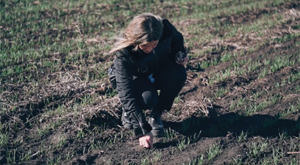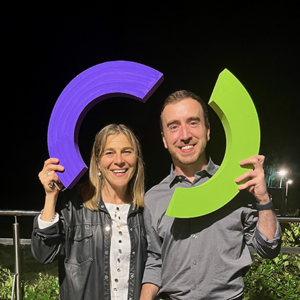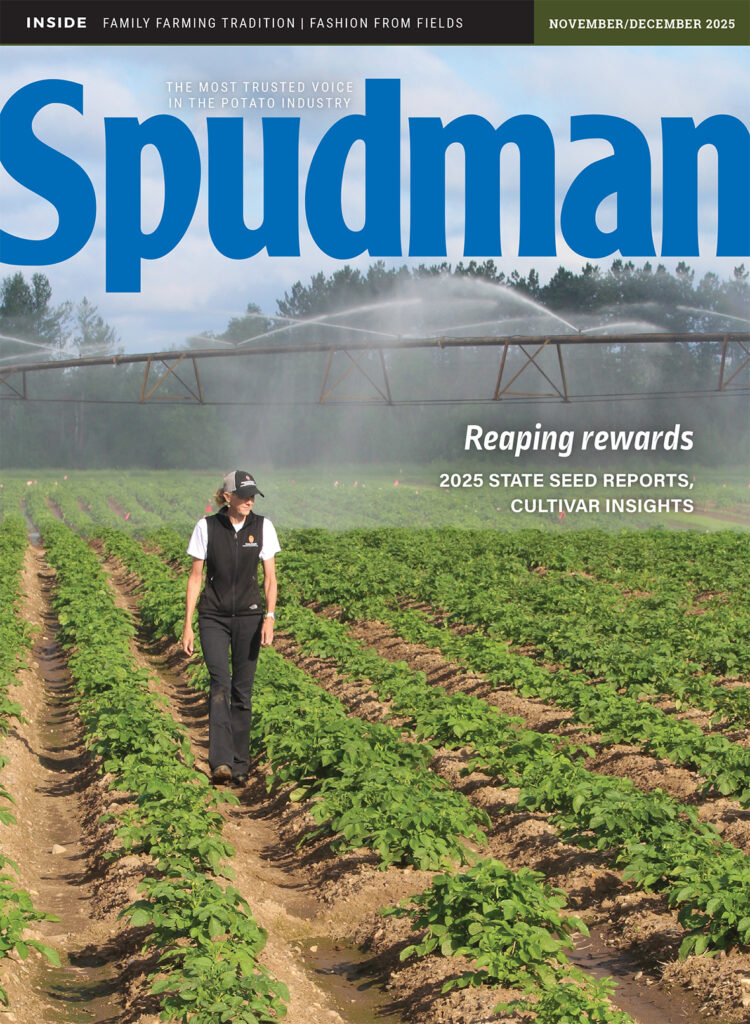
Startup piloting agriculture toward a less toxic future
Matias Figliozzi’s goal is simple, really. The CEO and co-founder of startup agritech company Unibaio wants to change the way the agriculture world works.
Specifically, he says his company’s polymer-based microparticles can drastically reduce agriculture’s reliance on chemicals including glyphosate, the world’s most widely used herbicide and the active ingredient in Roundup.
Glyphosate, which controls broadleaf weeds and grasses, has been registered as a pesticide in the U.S. since 1974. While the International Agency for Research on Cancer has classified the chemical as a probable human carcinogen, the EPA has found no evidence that it causes cancer in humans.
That debate aside, Figliozzi says Argentina-based Unibaio, which won the $1 million grand prize in the sixth annual Grow-NY international food and agriculture business competition in November 2024, has found a better way to protect crops, such as potatoes, that rely on herbicides and fungicides to prevent disease and improve production.

SAME POLYMER, DIFFERENT STRUCTURE
Farmers, including potato growers, spend an estimated $230 billion every year on herbicides, pesticides and fertilizers to increase crop yields. Instead of being absorbed, many of those chemicals leach into the soil, causing detrimental environmental effects as well as increasing resistance.
Unibaio’s particles trap the active ingredients of those crop treatments, enabling them to penetrate plants more efficiently while reducing application doses up to 80%, the company said.
“We use more Roundup than all the biological or organic alternatives for any purpose, and it’s used in all the major crops that humans need, like cotton or soybeans or wheat,” Figliozzi told Spudman during a recent interview. “All of them use massive amounts of this chemical.
“If we can modify that chemical formulation to have half of the active ingredient, that will be a significant impact on human health and the environment, and we’re working for that — hopefully before 2028.”

Driving this ambitious idea is chitosan, a bioactive polymer with a wide variety of applications made possible by functional properties including antibacterial activity, non-toxicity, ease of modification and biodegradability.
Claudia Casalongue, chief technology officer of Unibaio and a member of its co-founding team, comes from a farming town in Argentina, where her family used chemicals on their crops, Figliozzi said. Studying the hormonal system of plants with other scientists (and eventual Unibaio co-founders), Casalongue zeroed in on chitosan.
“There are a lot of papers and research about chitosan and how plants are able to attack it,” Figliozzi said. “That is mainly because it is the same type of material found on the surface of insects and fungi, so plants evolve to be able to attack the pests.”
The polymer’s complex chemical characteristics, however, can make its effectiveness challenging, Figliozzi said. In some cases, its uses involve solvents with too many biostimulants, which create toxicity. In other instances, it can prove too weak to be beneficial.
The researchers hit upon an idea: “What if we modify the structure of chitosan to create new properties?” Figliozzi said. “They worked with the chitosan molecule to create a version that has the ability to interact with different chemicals, both positive and negative.”
This is accomplished by adding a powder to chitosan’s chemical formulation, creating attachment with active molecules.
“In some cases, they get attached to the surface of our particle, and in some others, it gets absorbed inside of our particle,” Figliozzi said. “It doesn’t matter too much; what is relevant is that it creates this attachment just by mixing the powder (with) the chemical.”

Trials and testing, which have taken more than a decade, have included potatoes, Figliozzi said. A third-party trial with a government agency in Argentina produced higher yield and 10% bigger potatoes when the polymer was combined with glyphosate while requiring less applications, he said.
“Now we have something that was tailor-made for agriculture or agrichemicals for most commonly used chemicals and most crops,” he said. “We haven’t found any crop it doesn’t work with.”
The biodegradable particle works better in foliar application than root or soil, Figliozzi said.
“It’s energy for the microorganism that lives in the soil, so when you (apply it), it disintegrates really fast,” he said. “That limits the chemical combination, if the active nutrient needs to stay attached to our particle very long. Very long is more than 10 or 15 days. In that range, our particle disappears.”
The particle works the same if used to fight pests or boost plant health.
“The logic is the same,” Figliozzi said. “At the end, if we are feeding the plant with a nutrient, we need the plant to absorb the nutrient. If you’re (killing) a weed or (distributing) a poison to kill it, you need the plant to absorb the poison.”
NEXT STEPS START WITH APPLES
The Grow-NY competition, an annual event run by Empire State Development, gave Unibaio more than the cash prize, Figliozzi said. The expert mentorship provided to finalists helped the company find an initial target for its versatile tech: helping increase the efficacy of foliar control in apple production in New York state.

“Those are the early adapters, and from there we can grow,” Figliozzi said. “(The competition) helped us a lot to focus on the direct-to-farmer strategy.”
Unibaio will partner with N.Y. apple growers on the first use case this spring, Figliozzi said. By summer, the company hopes to market products directly to farmers.
“After that, we are going to grow to different crops, different states and different chemicals,” he said. “As we start navigating its value with fungicides, we are going to focus on those other crops that need higher efficacy or lower use rate in fungicides.”
Those parameters apply to potatoes, which rely on fungicides to fight the common and potentially devastating diseases of early and late blight.
Unibaio is already working with chemical companies to create products with its additive pre-formulated in pesticides, “but that’s a long-term goal,” Figliozzi said.
The company is establishing a U.S. headquarters in Ithaca, New York, and building its N.Y. team from two employees to 10 by the end of 2025.
“We are going to grow crop by crop, chemical by chemical,” he said. “We’re very focused on convincing the biggest players to modify their products. … If that happens, that will mean we’re removing hundreds of millions of chemicals from agriculture around the world.”














